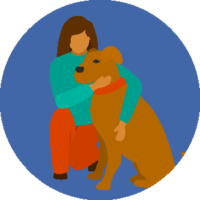
Be Bat Smart
Time to talk bats. Don’t worry! We’re not jumping to Halloween already; we’ll leave that to the retail industry. We want to discuss the bats that have been out all summer scaring some and amazing others.
Bats are beneficial to people and the environment by feeding on night-flying insects (including mosquitos) and pollinating plants and trees. Unfortunately, bats can carry rabies, so it is best to avoid contact with them and if contact does happen, know what to do. When it comes to bats, here are some safety tips.

People Safe
It is important to never handle any wild animal, especially bats. Teach children to never touch bats, even if they are dead, and to tell an adult if they find one. If you are outside in the evening or entering structures frequented by bats, cover up with a head covering and clothing. Bats have small teeth and claws so any bite or scratch can be difficult to see. Call your healthcare provider immediately if you or somebody you know has had contact with a bat or if a bat has been found in the room with:
- An unattended child
- A person who is sleeping
- A person under the influence of drugs or alcohol
- A person who may have physical difficulty knowing or explaining that they have been in contact with a bat

Pet Safe
It is not uncommon for cats and dogs to come into contact with bats, especially if they are outside at night. This is why it is a law in Washington state to prevent rabies transmission by getting all cats, dogs, and ferrets vaccinated against rabies. Since bats are active at night, it is a good practice to bring pets in, close doors and windows unless screened, and close pet doors at night.

Home Safe
Bats seek shelter under covered porches, in attics, in chimneys, and other areas of structures. Remember to make sure windows and doors that are left open are screened, close the damper on your chimney and fill any holes where pipes and wires enter through the siding of your home.
If you know a person or a pet that has or may have had contact with a bat, contact Spokane Regional Health District as soon as possible at 509.324.1560, ext. 7. For more information view our bat safety pages on the SRHD website.
